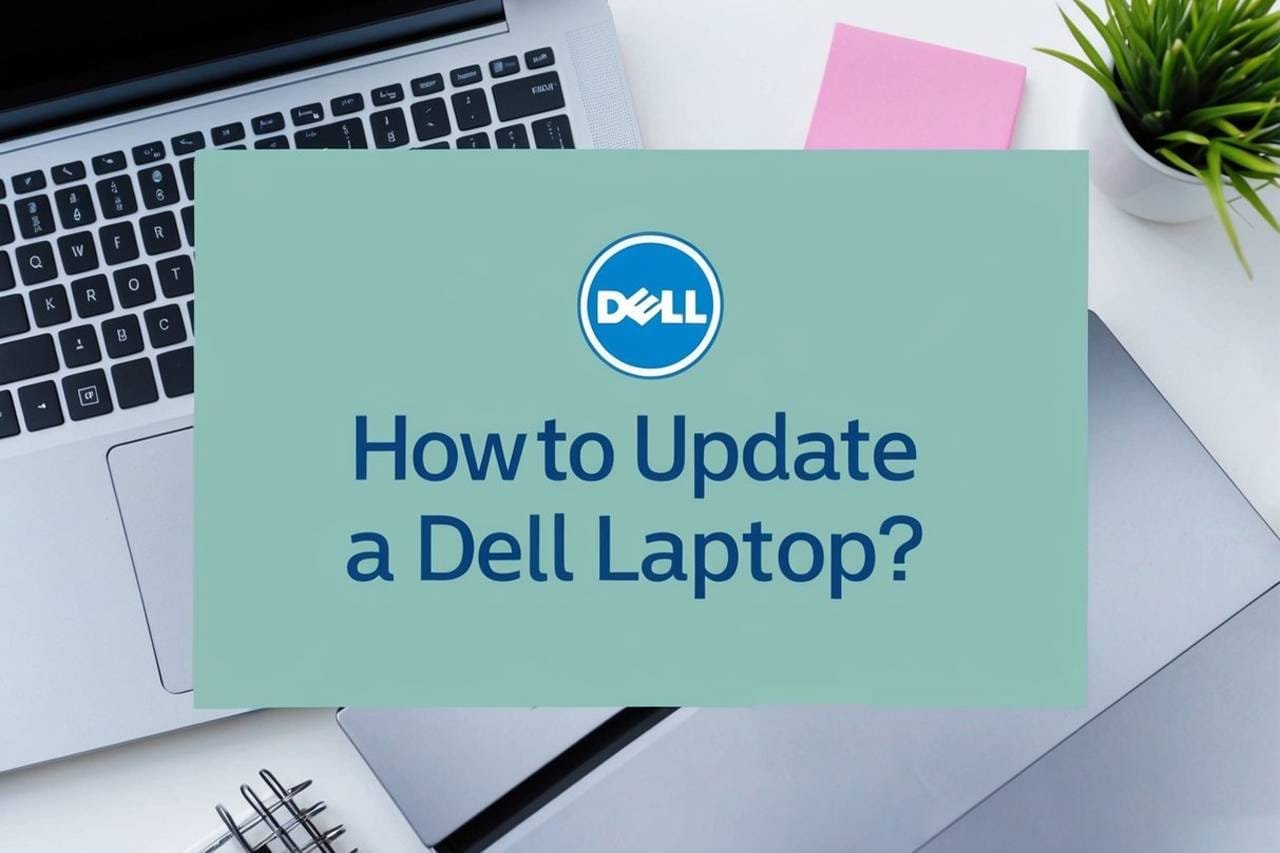Updating your Dell laptop might seem like a chore, but it’s crucial for keeping your system running smoothly and securely. Don’t worry, it’s not as complicated as it sounds, and I’m here to guide you through the process step-by-step.
Here’s a quick rundown of the steps we’ll cover to get your Dell laptop up-to-date:
- Back up your important data before starting any major update.
- Ensure your laptop is connected to a stable power source to avoid interruptions.
- Check for Windows Updates through the settings menu.
- Use Dell Update or SupportAssist to find and install Dell-specific driver and firmware updates.
- Restart your laptop to finalize the update process.
In this article, I’ll walk you through each of these steps in detail, providing clear instructions and helpful tips to make sure your Dell laptop update goes off without a hitch. We’ll also explore some common issues you might encounter and how to troubleshoot them.
What You’re Going To Need
- A Dell laptop
- A stable internet connection (Wi-Fi or Ethernet)
- A power adapter (to keep your laptop plugged in)
- An external storage device (like a USB drive or external hard drive) for backing up data (optional, but highly recommended)
Video Tutorial
While this article provides comprehensive written instructions, sometimes a video can be incredibly helpful. Here’s a link to a Youtube video that walks you through the process of updating a Dell laptop:
This video offers a visual demonstration of the steps we’ll be covering, which can be a great supplement to the written guide.
STEP 1: Back Up Your Important Data
Before you start any major system update, backing up your data is absolutely essential. Think of it as creating a safety net – if anything goes wrong during the update process, you’ll have a copy of your important files to restore.
Imagine the frustration of losing all your documents, photos, and music! Trust me, it’s not a fun experience. So, take a little time to back everything up, and you’ll have peace of mind.
There are several ways to back up your data:
- External Hard Drive: This is a popular option. Simply copy your files to an external hard drive. Windows has a built-in backup tool called “File History” that can help automate this process.
- USB Flash Drive: For smaller amounts of data, a USB drive is convenient.
- Cloud Storage: Services like OneDrive, Google Drive, and Dropbox allow you to store your files online. This is great for accessibility and off-site backups.
- Dell Backup and Recovery: Dell laptops sometimes come with their own backup and recovery software. If you have it, it’s worth exploring.
To use File History (if you’re on Windows), you can search for it in the Windows search bar. Connect your external drive, and File History can automatically back up your libraries, desktop, and favorites. You can also select specific folders to back up.
Tips for Backing Up:
- Prioritize: Decide what’s most important. You might not need to back up every single file.
- Organize: Make sure your files are well-organized so it’s easy to find and restore them if needed.
- Verify: After the backup, double-check that some of your files are actually there on the backup drive or in the cloud. Don’t wait until you need them to discover the backup didn’t work!
STEP 2: Ensure Your Laptop Is Connected to a Stable Power Source
Updates can take a while, and interrupting the process can cause serious problems with your system. Imagine your laptop suddenly shutting down mid-update – it could lead to corrupted files or even a non-bootable operating system. Not good!
To prevent this, make sure your Dell laptop is plugged into a reliable power source throughout the entire update process. Use your AC adapter and ensure it’s firmly connected to both your laptop and the wall outlet.
Even if your laptop’s battery is fully charged, it’s still a good idea to keep it plugged in. Updates can be power-intensive, and you don’t want to risk the battery draining unexpectedly.
Tips for Power Stability:
- Avoid using battery power during updates.
- Check your AC adapter: Make sure it’s working correctly and that the connection is secure.
- If you’re concerned about power outages: Consider using a UPS (Uninterruptible Power Supply) if you live in an area with frequent power disruptions. This will provide backup power in case of an outage.
STEP 3: Check for Windows Updates
Windows Updates are essential for keeping your Dell laptop secure and functioning optimally. These updates often include security patches, bug fixes, driver updates, and even new features.
Here’s how to check for Windows Updates:
- Open Settings: You can do this by clicking on the Start button (the Windows icon in the bottom-left corner of your screen) and then clicking on the gear icon. Alternatively, you can press the Windows key + I.
- Go to Update & Security: In the Settings window, scroll down and click on “Update & Security.”
- Check for Updates: In the “Windows Update” section, click on the “Check for updates” button. Windows will then scan for available updates.1
- Download and Install Updates: If Windows finds any updates, it will automatically download and install them. You may need to restart your computer to complete the installation.
- Optional: Advanced Options: In the Windows Update settings, you can find “Advanced options.” Here, you can configure update settings, such as when updates are installed. However, for most users, the default settings are fine.
Important Notes on Windows Updates:
- Internet Connection: You’ll need an active internet connection to download Windows Updates. A stable connection is key to avoid interruptions.
- Restarting: Be prepared to restart your laptop, possibly multiple times, to finish the update process.
- Feature Updates: Occasionally, you’ll encounter “Feature Updates.” These are major updates that can take longer to install, similar to upgrading to a new version of Windows.
- Windows 10 vs. Windows 11: The interface might look slightly different depending on whether your Dell laptop is running Windows 10 or Windows 11, but the general steps are the same.
Tips for Windows Updates:
- Check for updates regularly: Don’t postpone updates for too long. Regular updates are crucial for security.
- Schedule updates: If you’re on Windows 10, you can set active hours to prevent Windows from restarting automatically when you’re using your computer. Windows 11 is pretty good about this.
- Troubleshooting: If you encounter errors, Windows has built-in troubleshooters that can help. In the Update & Security section, you can find “Troubleshoot.”
STEP 4: Use Dell Update or SupportAssist
In addition to Windows Updates, Dell provides its own tools to update drivers and firmware specifically for your Dell laptop. These tools ensure that your Dell hardware is working optimally with the operating system.
There are two main tools you might encounter:
- Dell Update: This is a smaller, more focused tool primarily for updating drivers and applications.
- Dell SupportAssist: This is a more comprehensive tool that can also diagnose hardware issues, optimize performance, and provide support information.
Here’s how to use these tools:
- Check if Dell Update or SupportAssist is installed: You can search for them in the Windows search bar. If they’re not installed, you can download them from the Dell support website.
- Open the application: Launch Dell Update or SupportAssist.
- Check for updates: The application will scan your system for available updates. This might include:
- Drivers: Software that allows your hardware (like the graphics card, audio card, and Wi-Fi adapter) to communicate with Windows.
- Firmware: Low-level software embedded in hardware devices. Updating firmware can improve stability and performance.
- BIOS: Basic Input/Output System. This is the first software that runs when you turn on your computer. BIOS updates are important but should be done carefully.
- Applications: Dell utilities and software.
- Install updates: Select the updates you want to install and follow the on-screen instructions.
- Restart your computer: You’ll likely need to restart your laptop to complete the installation.
Important Notes on Dell Updates:
- Administrator Privileges: You’ll typically need administrator privileges to install driver and firmware updates.
- BIOS Updates: BIOS updates are more sensitive than other updates. Make absolutely sure your laptop is plugged in and that you won’t interrupt the process. A failed BIOS update can render your laptop unusable.
- Compatibility: Dell’s tools are designed to provide updates specifically for your Dell model, ensuring compatibility.
Tips for Dell Updates:
- Keep Dell Update or SupportAssist installed: These tools make it easy to keep your Dell laptop up-to-date.
- Check for updates regularly: Don’t rely solely on Windows Updates. Dell’s tools provide important hardware-specific updates.
- Read the descriptions: Before installing any update, read the description to understand what it does.
- If you encounter issues: Dell’s support website provides troubleshooting resources and documentation. You can also contact Dell support for assistance.
STEP 5: Restart Your Laptop
After installing Windows Updates and Dell updates, restarting your laptop is crucial. This allows the changes to take effect and ensures that everything is working correctly.
Here’s how to restart your laptop:
- Click on the Start button: It’s the Windows icon in the bottom-left corner of your screen.
- Click on the Power icon: It’s located just above the Settings icon.
- Select “Restart”: Your laptop will shut down and then automatically turn back on.
Why Restarting Is Important:
- Completes Installation: Many updates require a restart to finalize the installation process.
- Applies Changes: Restarting ensures that all the changes made by the updates are properly applied to the system.
- Improves Stability: A restart can help resolve temporary software glitches and improve overall system stability.
Tips for Restarting:
- Save your work: Before restarting, make sure to save any open documents or files to avoid losing data.
- Close applications: Close all running applications before initiating the restart.
- Don’t interrupt the process: Let the restart complete without interruption. Don’t turn off your laptop manually during the restart.
Final Thoughts
Keeping your Dell laptop updated is essential for maintaining its performance, security, and stability. By following these steps, you can ensure that your system is running the latest software and drivers.
Let’s recap what we’ve covered:
- Backing up your data is the first and most important step.
- Ensuring a stable power supply prevents interruptions during the update process.
- Checking for Windows Updates keeps your operating system secure and up-to-date.
- Using Dell Update or SupportAssist provides Dell-specific driver and firmware updates.
- Restarting your laptop finalizes the update process.
Remember to perform these updates regularly to keep your Dell laptop in top shape. And don’t hesitate to refer back to this guide whenever you need a refresher. With a little care and attention, your Dell laptop will continue to serve you well for years to come.



